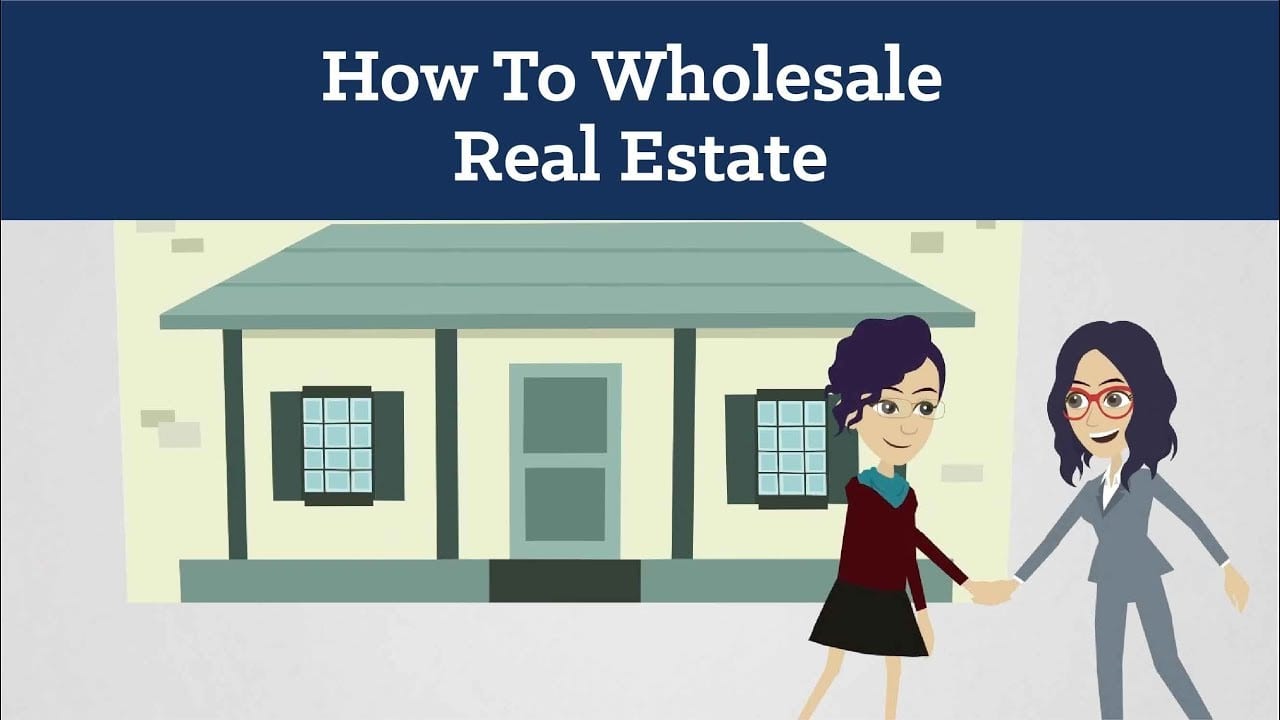This can be a great strategy for you to start hitting your income goals, and building a long term business. As you already know, wholesaling is a great way to get into real estate investing without spending a lot of your cash, and co-wholesaling is another great way to do the same! Co-wholesaling make it even simpler for you to get more deals done, you just need to know how to do it right!
So What is Co-Wholesaling?
First, let’s make sure we fully understand the concept of wholesaling… Real Estate Wholesalers are looking for discounted properties that they can put under contract and “flip” the contract for a profit, without taking ownership or doing any renovations. Basically, wholesalers will sell a property (the contract to it, rather) in “as-is” condition to another person who wishes to buy that property( or contract of purchase for the property) for a higher amount than the wholesaler has contracted it for. Usually, the end buyer is a fix and flip investor, or landlord.
Both parties understand who each other is in the transaction. The wholesaler is providing a service to both the seller and the end buyer. To the seller, the wholesaler is offering them a mutually agreeable amount for their property. Similarly, the end buyer is offering the wholesaler a mutually agreeable amount for the property (or contract) that allows both parties to make a profit. The wholesaler usually makes a smaller amount than the end buyer, but does so with little to no money out of pocket, and in a shorter amount of time. At settlement, the seller gets their money, as does the wholesaler, and the end buyer takes title to their new investment property. Its a win-win-win.
Co-Wholesaling is essentially this same process, but involves two different wholesalers coming together to help each other out. Often, one partner will have the property under contract with a seller, and the other will bring a cash buyer to close on the property. The co-wholesaling partners will each earn a portion of the total profit when they sell the property and make the negotiated wholesale fee. It’s actually pretty simple, and quite effective.
Is Co-Wholesaling Legal?
Yep, absolutely. However, as in any real estate transaction, the legality of the deal depends on how it is executed. A valid and legal contract provides a solid foundation for co-wholesaling, as does a valid and enforceable agreement between both parties. It is certainly possible to break the law while attempting co-wholesaling, an can even be done so unintentionally. which is why it is important to consult with the proper institutions when getting started. Know what is and isn’t legal in your state, or municipality.
In most cases, wholesaling and co-wholesaling is legal. Just as it is legal to purchase and sell a property, it is also legal to partner with someone else or another entity to do it as well. Wholesaling, and co-wholesaling, when done the right way is perfectly legal.
There are 2 ways to execute a co-wholesale deal:
- Assigning the Contract (assignment)
- Back to Back closings (double closing)
If you are a licensee (or aren’t) it is important to know the role of having (or not having) a real estate license in a co-wholesaling transaction. Many local Real Estate Boards have certain rules and regulations regarding the involvement of a licensee in a wholesale or co-wholesaling transaction and it is important to know what these are.
A couple ways to lower your risk when co-wholesaling, before putting a property under contract are:
- Know your local real estate laws
- Consult with an attorney if necessary
- Consult with a Realtor
- Use a legal and enforceable purchase and sale agreement
- Use a Joint Venture (JV) agreement
- Use proper Disclosure Agreements (particularly if you are a licensee – most issues that arise, do so out of improper Disclosure of Licensee Status)
It is always important to use caution when you engage in any activity that requires a license. be sure to know the local real estate laws to protect yourself and use a valid joint venture agreement. Make sure that the JV (co-wholesaling) agreement is written and signed before doing the wholesale deal, to ensure your interests are secured, and if you have any questions be sure to have it reviewed by a local attorney to ensure it is a legal, valid, and enforceable agreement. Also, make sure to use PDF format to make it easier to share, edit, and access.
Benefits of Co-Wholesaling
Co-wholesaling makes closing deals easier.
You are just 1 part of the equation, not both and you don’t have to wait to find the right buyer, or perhaps you don’t have a buyer’s list to begin with. If you have a deal, you can use co-wholesaling to find a buyer, that works with another wholesaler. The cash buyer list that belongs to another wholesaler, becomes a resource for you to get the property sold, make money, build relationships, and close deals and repeat the process. Co-wholesaling provides you with an opportunity to network with people outside of your own pipeline, and begin building your own network and long term wholesaling business.
When Done Correctly, Benefits of co-wholesaling Include:
- If you do not have a buyer(or buyer’s list) you can access cash buyer’s who can close on your deal from another wholesaler
- You will have more access to other deals for your own cash buyers
- You can leverage the experience resources, connections, and knowledge of the other wholesaler
- Scale your business by co-wholesaling as a key part of your business model.
- Closing more deals, and making profit becomes easier and more consistent
- Creating a valuable partnership with another wholesaler to JV with
- Allows you to play to your strengths. Maybe you are better negotiating deals, so focus on sellers. Maybe you have more buyers, so focus on finding wholesalers with deals for your buyers!
How Much Profit is made when Co-Wholesaling?
If you have a property under contract and consider co-wholesaling it, you will need to agree on a split of the wholesale fee with your co-wholesaling partner. In most cases, the split is 50/50. However, everything is negotiable, so be sure to outline the terms up front, and sign a JV agreement prior to contracting the buyer. It is very important that the JV agreement outlines the compensation split for both JV partners, so the title company knows how proceeds should be split at settlement.
Include a non-compete and/or non-circumvent clause or agreement as well. This simply ensures the protection and privacy of all parties involved. The last thing you WANT to happen is to partner with someone, without a valid agreement, and have them go directly to your source and circumvent you in the deal, Whether it’s this one, or another down the line.
Once you have a property under contract you may consider co-wholesaling it with a partner. You will need an assignment contract with a predetermined wholesale fee, so talk to your partner on how you will share the profit.
In general, most wholesale deals fall between $10,000 and $20,000 fee. So, when co-wholesaling you can expect to make between $5,000-10,000 per deal.
Are Specific Types of Properties Better For Co-Wholesaling?
Not really. No, actually. Well, not usually… Any property that is a “good deal” can be good for co-wholesaling. However, some properties may be more difficult in general, thus making co-wholesaling the property more difficult as well. Remember, any property that can be wholesaled can also be co-wholesaled!
Here are some examples of properties that co-wholesaling can be done with:
Townhouses and Condos
Townhouses and condos are attached units, and have strong comparable sales because most are veri similar, and are sold within the same development. Therefore, establishing value is easier, and makes co-wholesaling easier. However, it is important to note that HOA(homeowner’s associations) govern these properties may have specific rules or regulations regarding who can purchase them.(Some don’t allow for landlords, some are age restricted etc..), so be sure to check with the HOA before attempting to contract and/or co-wholesale a deal.
Single Family Houses
SFH (Single Family Houses) are probably the most frequently wholesaled and co-wholesaled properties, because they are most prevalent in many markets, and most end buyers are looking for single family homes, which makes sense that most fix and flip or landlords will be as well and wholesaling them is usually aery straightforward process.
Apartments (Apartment Complexes)
Dont be discouraged from investing in, or co-wholesaling apartments simply due to the cost, size, or number of units in the complex. The process can be very similar to that of co-wholesaling a single family house, or townhouse. As long as you have a strong buyer’s list, or partner with someone who does, you can co-wholesale apartment buildings. Although, make sure you are up to speed on the process of how apartment investors (syndication) evaluate, and finance these deals, as it usually involved a different evaluation and closing process.
Apartments and apartment complexes are valued based. Their values are determined by their net operating income (NOI), which differs from finding comps for single family homes . On the bright side, Assignment Fees for larger purchases, such as apartment complexes can be much higher and well worth it!
Mobile Homes
Wholesaling and co-wholesaling mobile homes has become more mainstream, and present great opportunities for both wholesalers, and investors alike. Many people have overlooked mobile homes, but with the constantly evolving markets, increased home prices, and low inventory, mobile homes present great opportunities for homeowners and renters, which in turn means opportunity for you as a wholesaler, or investor. You can co-wholesale a mobile home, or an entire mobile home park!
Commercial Real Estate
It is also possible to co-wholesale commercial real estate buildings such as retail offices, malls, strip malls, warehouse complexes, or mixed-use properties. Just like wholesaling or co-wholesaling a residential property, you will contract the commercial building(s) at a discounted price, and flip them to an investor who wants to operate the property.
Land and Lots
Raw Land, and buildable lots are a valuable asset in many areas, and can present a great opportunity for wholesaling and co-wholesaling alike. Just make sure you know what the land is worth, and what investors and builders are looking for, as well as the zoning and potential restrictions that may be imposed in certain areas of raw land or lots.
How to Find Co-Wholesaling Opportunities
The way to find co-wholesaling deals, is pretty much the way you find regular wholesale deals. Maybe you are doing well wholesaling properties and have an established network of cash buyers, then partnering with someone who has consistent deal flow of discounted properties would make a great way to play to your strengths.
Alternatively, if you have consistent deal flow, but lack a large cash buyers list, or perhaps just don’t have a cash buyer for a deal you have, then networking and partnering with a wholesaler who does, would be another option.
Each co-wholesaling partner brings something to the table, it’s why you are agreeing to split part of the assignment fee, right? RIGHT!
Co-Wholesaling vs. Daisy Chaining a Property
We have already established what co-wholesaling is… Daisy-chaining, on the other hand, happens quite often and is when someone attempts to wholesale another person’s wholesale deal without their permission. It’s basically trying to wholesale someone’s deal behind their back, without permission, without agreed upon terms. Usually this person will pretend to contrast the proper themselves, then re-assign it to their buyer for a fee, or find a buyer and then try to negotiate with you after the fact. This is simply not the way to do it, just be transparent, and develop a relationship rather than trying to daisy-chain a a property. Co-Wholesaling is a simple process, there’s just no need for this.


